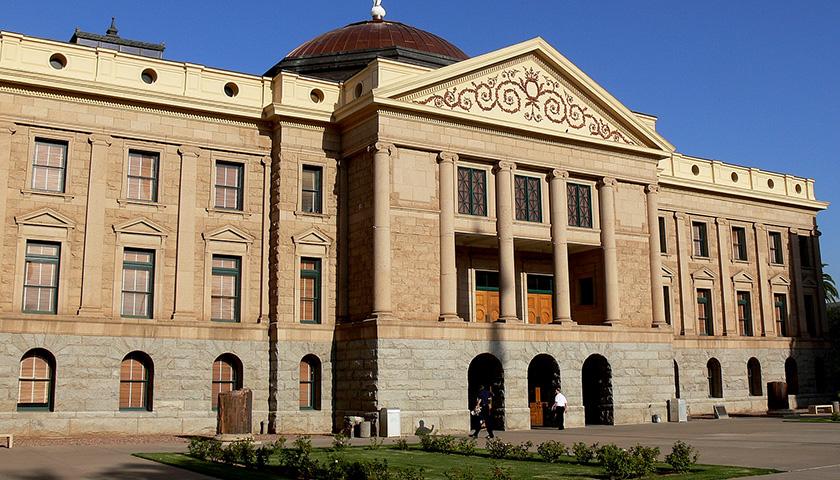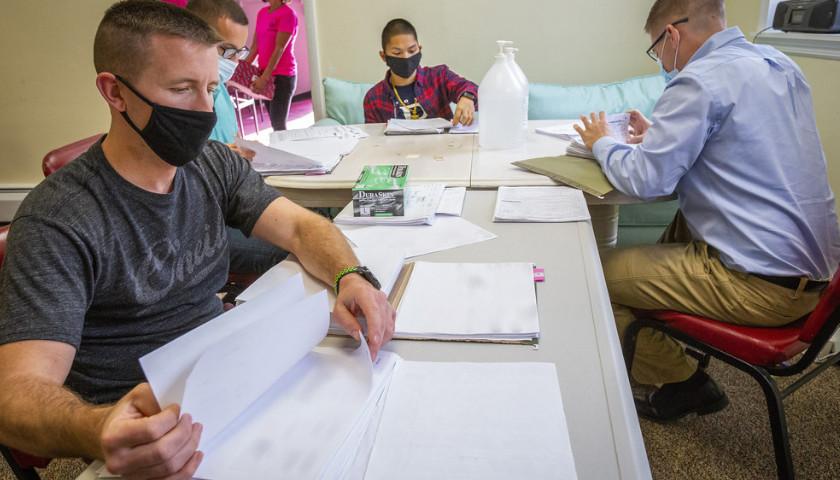Kari Lake’s appeal of the trial court judge’s ruling against her after two trials is pending at the Arizona Court of Appeals, and her attorney Bryan Blehm has taken to Twitter to continue providing updates as more information comes in about Maricopa County’s election problems. Blehm represented the Cyber Ninjas in cases related to its audit of Arizona’s problematic 2020 presidential election. He previously served as pro tem judge for Maricopa County.
On Wednesday, Blehm tweeted, “Did Maricopa County intentionally misrepresent user 134-speed clicker when they argued to the Court that he was reassigned from level-1 signature verification?” He included a tweet from We the People AZ Alliance (WPAA), which has been helping the Lake team investigate the 2022 election. “One of many lies told by County Attorney Liddy during the @KariLakeWarRoom @KariLake trial,” WPAA said. “Rey exercises great Kamala word salad.”
WPAA included a short video with the tweet showing attorneys asking questions of Maricopa County Elections co-director Rey Valenzuela during Lake’s second trial, including Maricopa County Deputy Attorney Tom Liddy. The video included subtitles that the organization had added critical of Valenzuela’s responses. Entitled “Lying Liddy & Rambling Rey,” it accused Valenzuela and Liddy of changing their story throughout the exchange.
The video began with Blehm asking Valenzuela about “User 134,” a Level 1 signature reviewer caught on video approving signature matches in less than one second each. Valenzuela stated that the reviewer, User 134, “was taken off the line.” The subtitle regarding that aspect of his testimony stated, “It should be obvious by now that this was an outright lie…”
Valenzuela said User 134 was “not meeting marks” and “being moved to another task.” The subtitles noted that Valenzuela’s testimony changed from saying that the user was “taken off the line” to “reassigned.” The subtitles said, “What he learned is that they realized their first argument backed them into a corner of admitting that a user was speed clicking his way through signature verification. This would open the door to also having to admit that there were actually up to 90 users that speed clicked 320,000 signatures at less than 3 seconds each.”
WPAA next noted in subtitles that Valenzuela’s testimony shifted again to “he did nothing wrong.” Valenzuela stated, “No supervisor found fault in what he was doing in Level 1.” He also said, “But he was perfectly qualified to continue doing level one review.”
WPAA refuted Valenzuela’s contention that some of the signature verifications showed up as taking less than one second because they were merely second reviews of the signatures. “Second reviews do NOT leave time stamps in the data,” the subtitle stated. “We can clearly see when someone is speeding through signatures.”
Valenzuela said that the user was not terminated, just reassigned, which WPAA said was “a lie” since Valenzuela had said the user was removed from the signature review. WPAA inserted a chart that showed that the user began working in signature verification on October 17, 2022, and continued working in that area up until November 11, 2022. WPAA showed a video clip from November 11 showing the user working to cure ballots, pointing out that since the signature review was complete by then, all of the signature review workers moved to curing. “Clearly he was never reassigned,” the subtitle stated.
Another tweet from Blehm on Wednesday addressed Maricopa County accepting ballots after the statutory deadline in 2020. “Maricopa County: Long Withheld Records Reveal More than 20,000 Mail Ballots Received on Nov 4th, 2020 After the Legal Deadline,” he said. “@USPS what happened to all of those undeliverable mail ballots? Maybe @RunbeckElection has the answer. http://VerityVote.US #BRANDON.”
Runbeck Election Systems is the third-party vendor that receives early ballots before they go to the county.
The tweet included a report from Verity Vote, which examined delivery receipts and records from the county and found that over 20,000 ballots were delivered to the county after Election Day, which was November 3, 2020, and stated there was no evidence they were rejected. The county claimed that they rejected only 934 ballots due to being late.
Blehm was responding to a tweet by Scott Presler, a GOTV activist, who asked, “What happened in Arizona on Election Day?”
Responding to a tweet about ballots allegedly driven from New York to Pennsylvania by a truck driver who worked for a USPS contractor, Blehm tweeted, “It would be a shame if Congress (@RepBryanSteil) were to call the @OIGUSPS & Jesse Morgan to testify on this matter… The @USPS cannot tell us where the Undeliverable Mail packets/ballots from Maricopa County ended up in 2020. @billgatesaz @TrumpWarRoom.”
Blehm pinned a tweet on June 10 which discussed ballot harvesting based on bad addresses. “#America, this is how elections work,” he said. “1. County mails hundreds of thousands of ballots, 20% to bad addresses. 2. Harvesters collect them and drop at a leftist group. 3. The ballots are voted and signed. 4. Mules drop them into drop boxes. 5. County ignore signature verification.”
#America, this is how elections work. 1. County mails hundreds of thousands of ballots, 20% to bad addresses. 2. Harvesters collect them and drop at a leftist group. 3. The ballots are voted and signed. 4. Mules drop them into drop boxes. 5. County ignore signature verification. pic.twitter.com/8QouuqHG0a
— Bryan Blehm (@BlehmLawAZ) June 11, 2023
Blehm’s tweets have started going viral as he is becoming nationally known as one of a few attorneys willing to take on election integrity cases. The 65 Project was launched by progressives in 2022 to target conservative attorneys with state bar complaints, especially attorneys who represent Republicans in litigation regarding suspected election fraud.
– – –
Rachel Alexander is a reporter at The Arizona Sun Times and The Star News Network. Follow Rachel on Twitter. Email tips to [email protected].
Photo “Kari Lake” by The Kari Lake. Background Photo “Maricopa County Courthouse” by Zeb Micelli. CC0 1.0.





